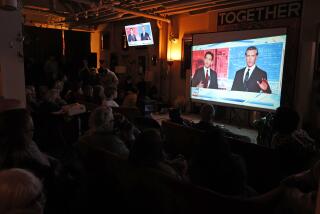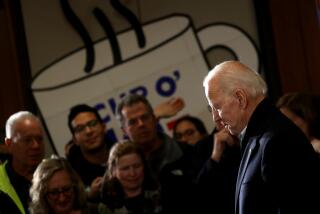FAMILY FEUD: For President Bush, the prospect...
- Share via
FAMILY FEUD: For President Bush, the prospect of confronting a challenge from conservative columnist Pat Buchanan in the Feb. 18 New Hampshire primary is taking on added complications because of friction between the state’s Republican governor, Judd Gregg, and his predecessor, now White House Chief of Staff John H. Sununu.
The hard feelings are rooted in a long-simmering feud involving Gregg’s father, Hugh Gregg, an ex-governor and early backer of Bush’s presidential ambitions. The elder Gregg is said to be miffed at Sununu for relegating him to a minor role in Bush’s campaign in the ’88 New Hampshire primary, which Sununu orchestrated.
His son is similarly resentful, associates say, because Sununu is said to have blocked the personal access to Bush that a Republican governor normally would expect. “I think he (Sununu) still thinks he is governor, in every sense,” Gov. Gregg complained.
Gregg quickly added: “I’m being flippant.” But New Hampshire Republicans say that the tension between Sununu and Gregg is no laughing matter for Bush, who needs a united front to avoid serious embarrassment from Buchanan’s anticipated challenge.
ANXIOUS WAIT: Politicians, attorneys and civil rights activists from around the nation are eagerly awaiting a Justice Department ruling on the Texas congressional redistricting plan due today. The ruling will give the first clear indication of how the department intends to enforce the Voting Rights Act requirement that states maximize the number of districts in which minorities constitute a majority of the population.
The plan--drawn by Democrats who control both houses of the Texas Legislature and the governorship--created two new Latino seats and one more black seat while protecting all Democratic incumbents; but Republicans and some civil rights activists maintain two more minority seats could have been created.
If the department accepts the GOP arguments, it could endanger other Democratic incumbents and send a signal that would affect the final lines in more than half a dozen states, including California. One troubling sign for Democrats: Last week the Justice Department rejected the Texas state House of Representatives’ redistricting plan for failing to draw enough minority seats.
CUOMO CHESS MOVE?: Even while he remained outside the Democratic presidential arena, New York Gov. Mario M. Cuomo displayed a gift for defining the debate to his own advantage. In a New York magazine interview, Cuomo opened fire at one already declared candidate, Arkansas Gov. Bill Clinton, deriding Clinton’s vaunted proposal for welfare reform and labeling his plan for a trust fund to finance college student loans “a lot of baloney.”
At first some Democrats thought Cuomo had erred. His harsh language, they contended, would damage his chances of becoming a consensus choice for backers of the other candidates should he enter the race. It was also argued that by attacking Clinton, the leading apostle of centrist change in party beliefs, Cuomo had reinforced his image as an adherent of outdated liberal dogma.
But upon a closer look, others saw a pragmatic purpose underlying Cuomo’s thrust at the Arkansas governor: To depict the contest for the Democratic nomination as mainly a confrontation between the centrist Clinton and the liberal Cuomo. Given the ideological balance of the party, Cuomo would be favored to win that struggle. Shunted in this scenario are two other candidates, Iowa Sen. Tom Harkin and Nebraska Sen. Bob Kerrey, Cuomo’s chief rivals for their party’s liberal base.
But Cuomo aides claimed that such strategies were far removed from their boss’s mind. “I wish he were that smart,” one said.
More to Read
Get the L.A. Times Politics newsletter
Deeply reported insights into legislation, politics and policy from Sacramento, Washington and beyond. In your inbox three times per week.
You may occasionally receive promotional content from the Los Angeles Times.










